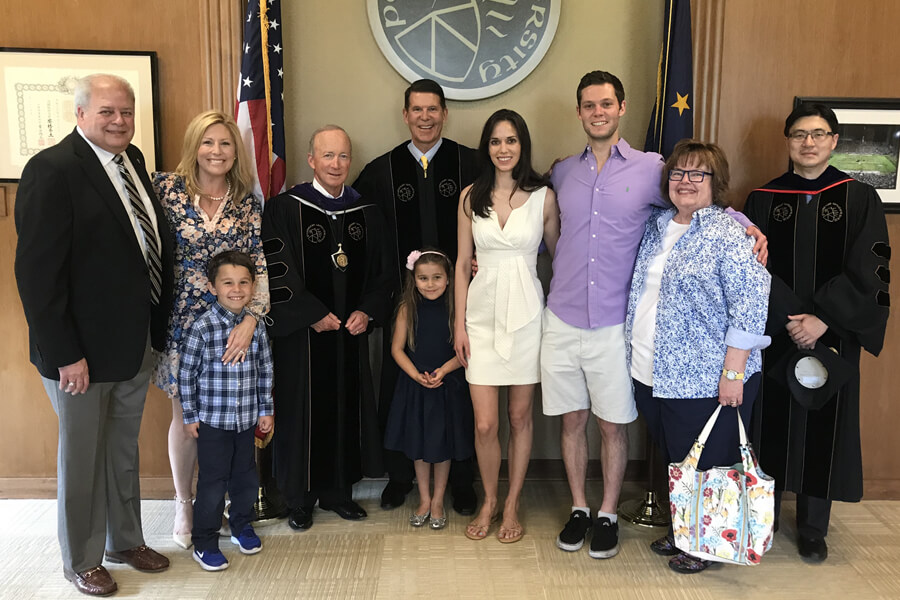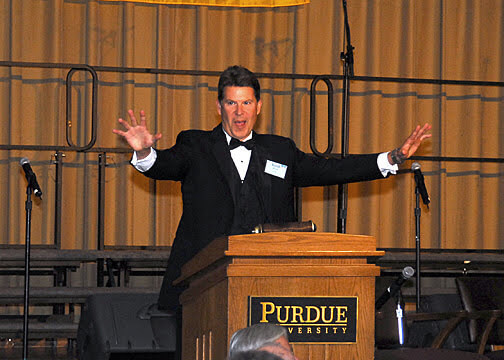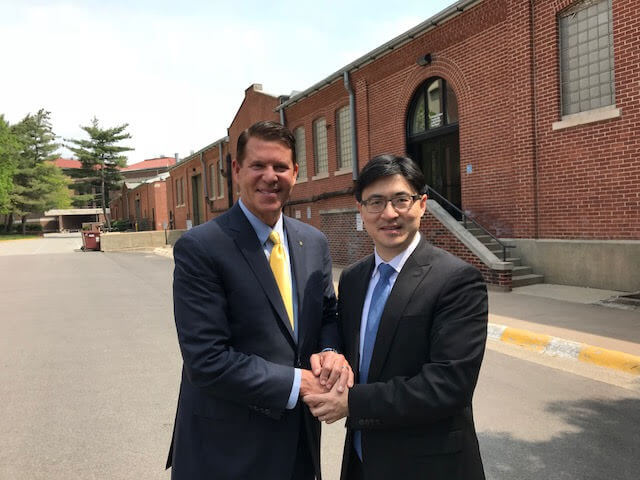Keith Krach's Gratitude and Vision for Purdue

Krach earned a bachelor’s degree in Industrial Engineering from Purdue in 1979 and then a Harvard MBA. Since then, the Rocky River, Ohio, native has distinguished himself as a world-class entrepreneur and a pioneer in robotics, e-commerce and digital transaction management. He was the youngest General Motors vice president (at 26), and has led category-creating companies DocuSign (of which he is chairman), Ariba, and Rasna Corporation. Among countless accolades, Krach was twice named Ernst & Young’s National Entrepreneur of the Year.

Deeply grateful to Purdue, Krach has given back generously. He served two terms as chairman of the Purdue Board of Trustees, ending in 2013. His accomplishments include appointing university President Mitch Daniels and launching strategic initiatives around student affordability and online learning. During his tenure, Purdue saw record research funding, higher retention rates, enhanced reputational rankings, and philanthropic giving of more than $1 billion. Thanks to a $10 million donation from Krach and his wife, Metta, the Krach Leadership Center opened in 2014 on Purdue’s West Lafayette campus. Krach currently serves on the recently formed Engineering Leadership Council (ELC).
In May, Purdue recognized its role-model alum, leader and donor with an honorary Doctor of Industrial Engineering degree.
Radiating Boilermaker pride, Krach says Purdue’s values, academics and people are a foundation of his success and says he is honored to be paying it forward.
In a recent conversation, Krach opened up about Purdue’s influence on his career and life. He reflected on some of the university’s transformative innovations, his vision for Purdue as an even bigger game-changer, and his hopes for the future of Purdue Engineering.
Enduring, Multifaceted Impact

Recalling his student days, he says: “When you’re a freshman in college, your life can go in a lot of different directions — not all of them good. But Purdue was just what I needed. It reinforced all those great values I learned from my mom and dad at home. Working hard. Having integrity. It was all a part of life at Purdue. In the business world, you can get pulled in a lot of different directions, but that integrity I learned at home was reinforced at Purdue, and it stuck with me — even when it was rough.
“I also benefited from the quality and rigor of Purdue Engineering. I spend more time in the boardroom than in engineering now, but the solid technical foundation I built at Purdue has benefited shareholders more than they know over the years.
“Purdue also gave me priceless opportunities to learn leadership in a safe, family-like environment. I learned a lot of important lessons – by trial and error – on the Old Masters Central Committee and as president of the Purdue chapter of Sigma Chi fraternity. Most of what I know about building winning teams in business, I learned at Sigma Chi.”
Reflecting on his relationship with Purdue as an alum, Krach says, “Purdue alumni are extraordinarily loyal. To me, that meant I could count on a global network of friends, mentors and business partners – for years and years after I graduated.”
Recalling the importance of Purdue mentors, Krach says, “My grandma used to say the most important things aren’t written in a book – and she was right. Two of my fellow Industrial Engineering alums who have been very successful have been incredibly generous to me with their advice and life-experience along the way. Another fellow Purdue grad – a very dear friend – has joined me in building six different companies. And multiple alums are on the DocuSign Advisory Board.” In addition, Krach says: “Almost anywhere I go in the world, I find Purdue friends. We share an instant common bond.”
Thinking of his service as chairman of the Board of Trustees, he says, “One of the highest privileges of my life was having an opportunity to help transform a great university that gave me so much.” Krach credits the board’s groundbreaking accomplishments to Purdue’s exceptional leadership, noting that Daniels is widely considered “the most transformational leader in higher education today.” And Krach says Daniels’ predecessor, France Córdova, “was a role model in bringing women into STEM.” Besides offering the opportunity to work closely with these visionaries, Krach says his board service taught him the value of patience and perseverance, “traits more common in a university setting than in a hyper-growth Silicon Valley company.”
Standard-Setting Innovations
The Board of Trustees’ focus on a handful of strategic initiatives has enabled Purdue to exert powerful influence on higher education and business, Krach says. For instance, he shares: “Something I’m really proud of is how Purdue has set the standard for student affordability. Student loan debt in this country has reached $1.4 trillion, and a major driver is the rising cost of tuition. For the last seven years, we’ve frozen tuition at Purdue, through the generosity of our loyal alumni base and aggressive cost management. At the same time, we’ve continued to attract world-class professors and increase academic standards across all disciplines.”
In addition, Krach says, “Our quantum leap in online learning, by acquiring Kaplan University and launching Purdue University Global, enables us to expand our international reach and turbocharge the fulfillment of our land-grant mission of retooling the workforce.”
Regarding the workforce opportunity, he notes: “There’s going to be a tremendous displacement of workers because of sweeping automation and productivity enhancements. The companies I’ve built are bringing about some of those changes. For example, Mike Corbat, the CEO of Citigroup, told me that over the next 10 years, it’s estimated that one-third of retail banking jobs will go away.”
Vision for Purdue
“My vision is that Purdue will be the preeminent global university developing leaders for the value-creation industries,” Krach says. “Purdue will be the catalyst for retooling the workforce, leading the way in forming private, public, social and academic partnerships.”
Krach foresees Purdue “leveraging Purdue University Global; partnering with schools like Ivy Tech for apprenticeships and mentorships; bringing more women into the workforce, particularly in STEM; and creating teams of people with different temperaments, talents and convictions, as well as diversity of thought.”
In one example, he says Purdue’s broadened online learning has the potential to address the challenge of prison reform. “Our online courses can enable incarcerated people to build their skills so they can get a good job when they’re released and not return to prison,” he points out.
Prominent Role for Purdue Engineering

Krach sees the College of Engineering at the forefront of extending Purdue’s leadership in reshaping the workforce.
“Superior leadership, international scope and a focus on value creation, combined with Midwestern values, put Purdue Engineering at the top of the list,” he says.
Elaborating, Krach calls Mung Chiang, the John A. Edwardson Dean of the College of Engineering, “one of the finest deans of engineering I have ever seen or could imagine.” Furthermore, Krach says Purdue Engineering’s large international student population promotes a global mindset, along with “diversity of thought – the catalyst for genius.” In addition, he notes that value-creation industries, for which the College prepares students, “increase innovation and productivity, raise the GDP, improve the standard of living, increase our international competitiveness, and spur job growth.”
Krach concludes, “Purdue and Purdue Engineering are uniquely positioned to drive the transformation of our nation’s workforce – and our economy — to power the next generation of business evolution.”
For more information, visit:
Elements of Entrepreneurial Excellence
Purdue influences, as well as more than 35 years of exemplary business leadership, have given Keith J. Krach a wealth of insight on what it takes to excel as an entrepreneur. Tapping his textbook learning, mentors’ guidance, and Silicon Valley experience, he outlines these chief ingredients:
-
Innovation and challenging the status quo.
“The key to innovation is to look at how things have been done and how you can do them better,” he says. “But if you want your company to have a massive impact, the objective of the game is innovation at scale – transformational leadership across global boundaries.” -
Strategy.
Krach’s advice: “Why build a product when you can create an entirely new category and become the category king, setting the global standard? Research shows that 80 percent of the resources and 80 percent of the valuation goes to the category king. Also keep in mind that leadership today is not defined by size but by momentum, particularly in Silicon Valley, where people skate to where the puck will be. When you’re creating your category, start by developing the customer value proposition and inspiring a shared vision.” -
A high-performance team.
In Krach’s opinion, building such a team is “the Number 1 job of the CEO or founder.” He counsels: “The company with the best people wins, so recruit the best people, provide leadership and professional development, and get everybody to work together as a team. Your people need to focus on carrying out a common mission and defeating a common enemy. At the companies I’ve helped grow, the mission has been to increase productivity and the enemy has been paper. Make the mission crystal-clear, and use a playbook of vision, mission, values, team rules, and long-term goals or strategy. Of course, in the end, it all boils down to execution.”
